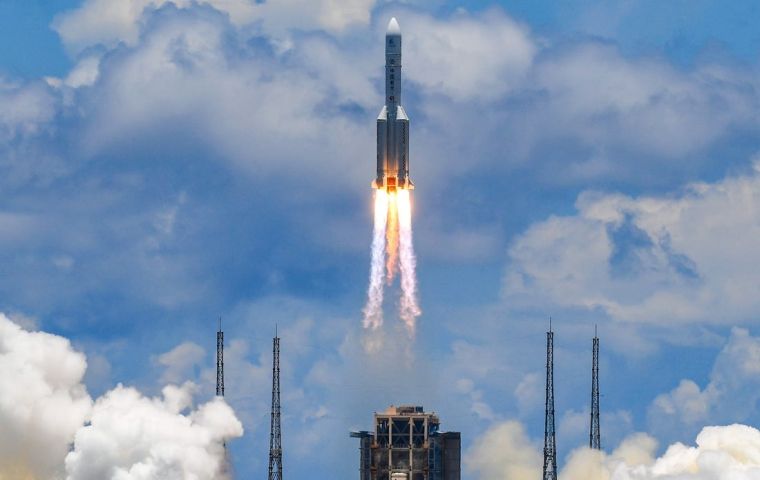MercoPress. South Atlantic News Agency
A milestone for Beijing's space program: China launches Tianwen-1 with a rover to research Mars
 China's Mars probe lifted off on Jul 23 from the southern island of Hainan. The mission was dubbed Tianwen-1 (“Questions to Heaven”)
China's Mars probe lifted off on Jul 23 from the southern island of Hainan. The mission was dubbed Tianwen-1 (“Questions to Heaven”) China launched a rover to Mars on Thursday, another milestone for its space program after putting humans into orbit and landing a probe on the moon. It is among a trio of nations, along with the United Arab Emirates and the United States, launching missions to the Red Planet this month, taking advantage of a period when Mars and Earth are favorably aligned.
Beijing's space program has made huge strides in recent years as it tries to catch up with the United States and Russia.
China's Mars probe lifted off on Jul 23 from the southern island of Hainan. The mission was dubbed Tianwen-1 (“Questions to Heaven”) in a nod to a classical Chinese poem that has verses about the cosmos.
The probe aims to go into Martian orbit, land on the planet and release a small rover to conduct research on its surface. The craft will travel at least 55 million kilometers to reach its destination. It will arrive seven months after launch, in February, according to an official.
But it is not China's first attempt to go to Mars. A previous mission with Russia in 2011 failed because the Russian launcher was unable to get the craft into a transfer orbit to slingshot towards the Red Planet.
The hardware partially disintegrated as it later crashed back to Earth. Following that failure, Beijing decided to try again on its own.
“Its purposes are not different from those of other countries: develop the capability, explore the universe ... and finally, create political influence and national prestige,” said Chen Lan, an independent analyst at GoTaikonauts.com, which specializes in news about China's space program.
The rover, weighing 240kg, has six wheels and four solar panels, Chinese state media reported. The rover will roam Mars for three months, according to Sun Zezhou, chief engineer of the probe. The machine is supposed to analyze the planet's soil and atmosphere, take photos, chart maps and look for signs of past life.
China sent two rovers to the moon, Jade Rabbit One and Two (Yutu in Chinese), in 2013 and 2019. The second rover made a historic soft landing on the far side of the moon, making China the first country to do so.
“The lunar Yutu rovers are good practice in many ways for a Martian rover. The terrain is broadly similar,” Jonathan McDowell, an astronomer at the Harvard-Smithsonian Center for Astrophysics said.
But the distance from Earth means communication will be slower, McDowell said, adding that the risk of problems increases with such a long trip.
China has poured billions of dollars into its space program to catch up with the US, Russia and Europe.
In 2003, it became the third nation - after the US and Russia - to send a human into space. It has launched a slew of satellites into orbit, completing a constellation in June to set up its own navigation system, Beidou, to rival the US GPS system.
The Asian powerhouse plans to assemble a space station by 2022 in Earth orbit.




Top Comments
Disclaimer & comment rulesCommenting for this story is now closed.
If you have a Facebook account, become a fan and comment on our Facebook Page!